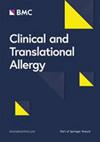CCL2/C–C chemokine receptor type 2-mediated interactions among mast cells, basophils, and endothelial cells
Abstract
Background
IL-33 is involved in allergic processes by promoting the release of various mast cell (MC) chemokines, including CCL2. However, it is yet unclear which specific cell type is primarily responsible for producing CCL2 during acute allergic reactions. This study aims to investigate the role of IL-33 in promoting CCL2 production in mast cells and assess the effect of MC-derived CCL2 on basophil migration and endothelial permeability.
Methods
Human blood-derived MCs (hMCs) were generated from peripheral blood precursors, passively sensitized with IgE, treated with IL-33, and stimulated with anti-IgE. The concentrations of nine cytokines known to influence immune cell chemotaxis (CCL2, CCL5, CCL11, MIP-1α, IL-8, IL-10, IL-13, granulocyte-macrophage colony-stimulating factor (GM-CSF), and vascular endothelial growth factor (VEGF) were assessed in the supernatants of hMCs. Subsequently, we investigated the impact of MC-derived CCL2 on basophil migration in vitro, as well as its effect on endothelial monolayer permeability using human umbilical vein endothelial cells (HUVECs).
Results
Stimulation with anti-IgE induced a significant release of CCL2, GM-CSF, IL-8 and VEGF from hMCs. Additionally, incubation with IL-33 overnight increased the production of several cytokines. Mast cell-derived CCL2 not only enhanced basophil migration in vitro but also increased endothelial monolayer permeability in HUVECs. The effect was reversed by a C–C chemokine receptor type 2 (CCR2) antagonist, indicating the involvement of CCL2 signaling through the CCR2 receptor.
Conclusions
IL-33 induces the production of chemotactic cytokines in hMCs. Mast cell-derived CCL2 plays an important role in basophil chemotaxis in vitro and affects endothelial monolayer permeability in the HUVEC model.


 求助内容:
求助内容: 应助结果提醒方式:
应助结果提醒方式:


